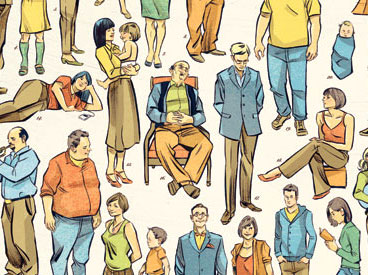Down South, which is where my father’s side of the family comes from, family reunions are a summer tradition. Aunt Kate’s watermelon basket meets up with Aunt Jane’s cornbread and cousin Annie’s (first) ex-husband’s smoked ribs, while everybody catches up with everybody else.
Pregnancies are announced, engagement rings studied, medical diagnoses questioned, and Grandmother Nettie’s recipe for cucumber lotion—an anti-wrinkle remedy—quietly passed around to those in need.
Standing around the picnic table sipping sweet tea as my uncle pontificates on the lack of civility among young people, I look around at the assembled aunts, uncles, fathers, mothers, greats, grands, and cousins two-, three-, or four-times removed and realize that a family gathering not only reconnects whole generations of folks, it also builds a support network that allows us to weather all kinds of ills.
There’s always a mother or aunt who’s ready with a shoulder to cry on, strong arms to lift you up, and a nurturing spirit that puts her right up there with the angels. There’s always a cousin who’s ready to pull your car out of a ditch—or your husband out of a bar—and an uncle who’ll give you his last five bucks if you need it.
Unfortunately, in most families, there are also an equally bad cast of characters who like to cause trouble, particularly when the whole clan gets together and offers them a stage. Grease the boards with a keg of microbrew or a few pitchers of sweet tea spiked with rum, and it can get so dramatic you could sell tickets.
But, as Los Angeles psychologist Leonard Felder, author of When Difficult Relatives Happen to Good People, points out, “They’re still the people who can teach you to be civil when you don’t want to be—and the people who can teach you to look past the surface of other human beings to find the wounded child within. They’re also the only people who—as you debate whether to stay or go, forgive or not—can give you a deep emotional ‘workout’ that leads to personal growth.”
“Even if your relatives are obnoxious,” he adds, “they’re still irreplaceable.”
Putting down my sweet tea to accept the even sweeter blessing of a small cousin’s hug, I think about Felder’s words. He may have a point. But how do you manage to reap the benefits of connection and avoid the backsplash of toxicity?
First, says Felder, you need to figure out how to shape your own reaction to relatives’ sometimes oddball and often hurtful behavior. And, second, you need concrete strategies that will stop them in their tracks. Turn the page for some common caustic family archetypes drawn from my own experience—and what to do about each one.
Helpful Hannah
Your sister Hannah means well. She really does. She has lots of advice for you every time the two of you cross paths. And, after receiving the advice, you’re just about set to strangle her.
The Problem: You can always count on Hannah making suggestions about how you can better manage your weight, your kids, or your job. Aww, isn’t that nice? It sounds to everyone else as though she’s a concerned big sister who is trying to help, but her words simply make you feel overweight and incompetent.
The Solution: Reacting emotionally to her negativity is a trap, says Felder. Instead, try a little understanding. In some families the “helpful” big sister might just be doing unto you what was done unto her. Perhaps your mother constantly criticized her weight, for example, so now Hannah takes it upon herself to pass that legacy on to you. Or maybe, just maybe, she really means well because being overweight and lacking parenting or job-related skills has cost her big time—and she doesn’t want that to happen to you.
To blunt the impact, you need to have a conversation with yourself before Hannah starts picking at you. Say to the Hannah that resides in your head, “Thanks for teaching me who I don’t want to be.” It will crystallize the differences between you and Hannah and allow you to respond to her compassionately and without resentment.
As for a strategy that will stop her in her tracks, that’s easy, says Felder. If she starts giving you tips on how you should be raising your kids, answer with, “You’re probably right. I’m gonna think about what you’ve suggested. But right now let’s talk about something else besides kids.”
The Perfect Nephew
This is a relative I happen to be very familiar with. Let’s call him Robert.
The Problem: The little twerp “borrowed” his parents’ life savings to start a business and lost it. Now he’s moved on to my widowed mom. “Dear Robert,” she said to me at last year’s get-together. “He’s so helpful. Always willing to make sure I hear about a new investment opportunity.”
Last time the “investment” was in Robert’s boat. I admit I’d like to back my cousin into a corner and give him a piece of my mind. But as Felder points out, 20 years worth of studies have now discredited the once-popular theory of scream therapy—you know, where you “express yourself” through genuine rage. Although it may feel good temporarily to really let someone have it, more recent research has discredited this pour-oil-on-the-fire approach.
The Solution: Nothing can unhook you from your usual negative reaction to someone like humor, says Felder. The approach I favor: Simply look quizzically at the person as though he’s a bug under your microscope, note his more bizarre qualities, and silently classify him as a Mephitis mephitis (striped skunk) or Agkistrodon contortrix mokeson (northern copperhead). Or, as in my cousin’s case, a Hadogenes troglodytes—a big, fat scorpion.
Big Mama

Your mother-in-law actually has some good qualities. In fact, when it’s just the two of you alone, you get along just fine.
The Problem: You married her little boy, the youngest of the clan. He’s all grown up now, but Big Mama still calls him a couple of times a week, talks to him for hours, and always has some little thing—a blocked drain, a marauding mouse—that he needs to come over and take care of. When the family gets together she wants him by her side, talks to him constantly, and fires subtle put-downs directly at you when you join them.
The Solution: “Make your relationship about when someone’s humanity comes across, not their worst moments,” says Felder. If the two of you enjoy being together when you’re alone, offer to come early to the gathering and help her set up. Or offer to come early and cook. Then use those moments to connect.
When your husband arrives, give him up gracefully. “Tom, why don’t you get your mom a drink and take her down by the lake?”
True, Big Mama’s sure to get off a few shots before she goes quietly into the night. So to keep your blood pressure down, keep score. Count the number of zingers she sends your way and write it down when you get home, suggests Felder. Then, after every family gathering, compare the totals. “An ironic sense of wit can keep you from being destroyed,” says the psychologist. “If last year you got pissed off after 20 minutes, but this year you lasted an hour—congratulations!”
Husband #3
Your cousin Sarah has divorced two lovely but flawed men. One was lazy and the other was a drunk. Now she’s presenting husband #3 as the crown prince with whom she will happily live forever.
The Problem: Chances are this one will be gone before sundown. So how do you hang around with him at family gatherings but not get so close you’ll get hurt when he disappears?
The Solution: “Keep your heart open,” advises Felder. Just because you’re afraid you’ll have to share another guy’s pain and suffering in the future is no reason to keep him at arm’s length now. Why should your cousin define your relationship? And if husband #3 becomes a good friend, well, hey!—friends are hard to come by.
The Beauty Queen
She’s gorgeous. And smart. And one of the nicest, kindest people on the planet.
The Problem: Every time you see her, you get so jealous it gives you a stomachache. How can you make her feel as ugly as you do?
The Solution: You can’t. But you can shape your reaction to her, suggests Felder. “Realize that the Beauty Queen has at least one flaw that people who are really close to her know about. Do some people research and see what it is.”
The point is not to use this information against her, but simply to help you see her as an ordinary, fallible human being with the same kinds of faults as anyone else. Ask yourself, what is it about her that really sets you off, suggests Felder. You’re likely to find this test extremely revealing—about you. “All of us have character traits that we get to work on,” explains the psychologist.
Nasty Nell
Solving the “Nell Challenge” is harder than getting rid of the zombies in The Walking Dead.
The Problem: Dear Aunt Nell loves telling you what your mother said about you at bridge the other day, and the worse you feel the happier she seems to get. She actually enjoys making other people feel bad.
The Solution: Unfortunately, says Felder, “there are a variety of people who feel better about themselves by poking at the vulnerabilities of others.” You’re not going to change them, but you have a good shot at changing how they affect you by learning more about them. Ask older relatives how Aunt Nell was when she was a girl. Ask when she started to get nasty, and what was going on in her life at the time.
You may find that she was dumped by someone she loved, prevented from going to college, or trapped in the town she grew up in by the need to care for an aging relative.
Then ask yourself how Aunt Nell might feel when she looks at you. “Is there something about you or your choices in life that might intimidate or threaten her?” asks Felder.
Thinking about all the blessings that flood my life, the people who love me, and all that I’ve been able to do and be, I begin to see my aunt’s actions in a different light. And that little cognitive shift has allowed me to accept her for who she is. I find it’s a gift to regard her with compassion even as her latest barbed comment rips into my skin—and to respond to her quietly and with love.
As Felder says, “Sometimes the spark in someone is really well hidden. You really have to look for it. And sometimes the most difficult people—that ex-spouse, that toxic parent, that obnoxious sibling—can be the one that forces us to the most growth.”
Become a Saturday Evening Post member and enjoy unlimited access. Subscribe now




Comments
I loved looking at the group picture illustration of all the people !!…Each and everyone of my relatives is somehow in that drawing….still laughing.